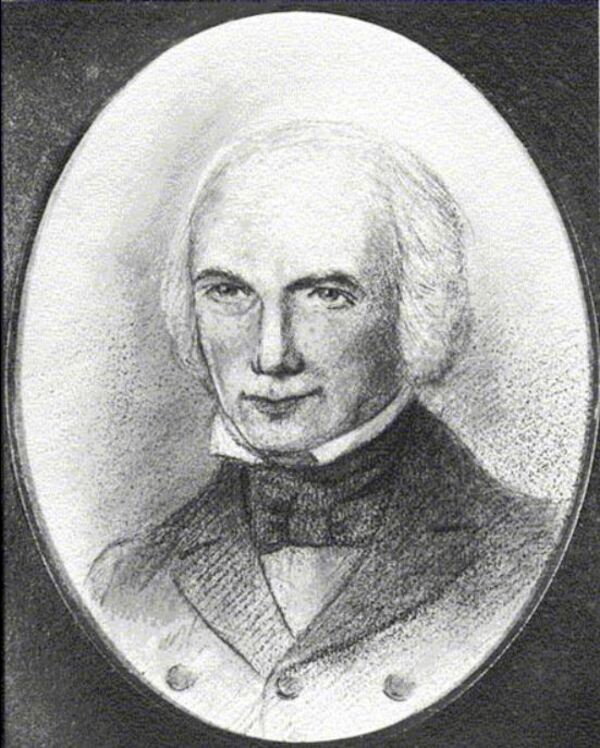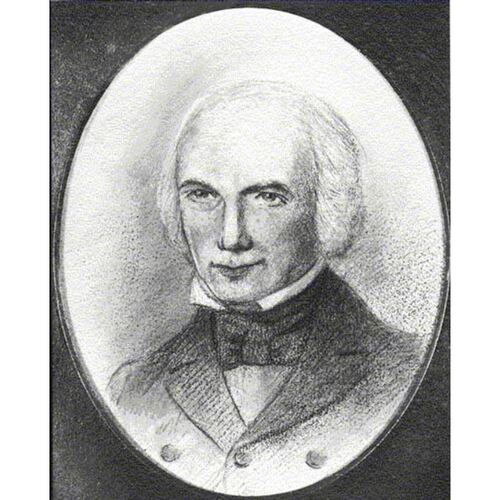
Source: Link
BERCZY, CHARLES ALBERT, businessman, office holder, and justice of the peace; b. 22 Aug. 1794 in Newark (Niagara-on-the-Lake), Upper Canada, son of William Berczy* and Jeanne-Charlotte Allamand*; m. 21 June 1828 Ann Eliza Finch in Amherstburg, Upper Canada, and they had at least one son and seven daughters; d. 9 June 1858 in Toronto.
Charles Albert Berczy was born in the midst of his father’s attempts to establish a settlement in Markham Township, north of York (Toronto). The Berczys settled in York in 1794 and remained there until 1798, when the failure of the settlement scheme prompted them to move to Montreal. The family returned to York in 1802 but from 1804 lived in Montreal and Quebec. When the War of 1812 broke out Charles became a clerk in the British commissariat at Montreal. Between 25 Dec. 1814 and 24 April 1816 he served as acting deputy assistant commissary general, a position which no doubt aided his advancement in Canadian society. By 1818 he had settled at Amherstburg, in the Western District of Upper Canada, and soon entered into business there with his brother, William Bent*. William later claimed that their shipment of tobacco in 1821 was the first ever exported from Upper Canada.
Within a few years Berczy found favour with the district’s official oligarchy. He received his first commission as a justice of the peace in September 1826 and five years later was appointed to the lucrative position of postmaster at Amherstburg. As a prominent office holder he gradually ascended within the provincial hierarchy and also gained considerable knowledge of political activities in Kent and Essex counties. In 1835, because of his postal experience and friendship with Thomas Allen Stayner* (deputy postmaster general of Upper and Lower Canada), Berczy was appointed to the newly created position of post office surveyor, or inspector, stationed in Toronto and responsible for all of the territory west of Kingston.
During the rebellion of 1837–38 and its aftermath in Upper Canada Berczy was secretly employed by Lieutenant Governor Sir Francis Bond Head* “to maintain a Correspondence throughout the Province to the designs of Foreign & Domestic Enemies.” He was responsible for the surveillance of postmasters such as Joseph Watson of Lloydtown, whom he dismissed in 1837 for treasonous activity, and in 1838–39 he coordinated the secret service activities of at least 13 agents. In April 1838 Berczy was appointed postmaster of Toronto, replacing James Scott Howard*, who had been suspected of being too close to the rebel cause. Once settled in the capital, he gave political advice and assistance to Head’s successor, Sir George Arthur. Feeling that he still had “influence enough” in the Western District, at Arthur’s request Berczy tried, unsuccessfully, during the election of 1841 to persuade Joseph Woods to withdraw from the campaign in Kent in order to secure the return of Samuel Bealey Harrison*. As a result of such activity and his management of the large Toronto post office, Berczy gained increasing influence in the political and business world of Toronto. In 1840 John Strachan* had regarded him as “an officer of great merrit – he is attentive to his duties which he discharges in a manner highly satisfactory to all concerned,” although, according to William Henry Griffin*, the post office’s eastern surveyor, he never “distinguished himself particularly in any way.”
Berczy soon became involved in numerous entrepreneurial activities. He was a director of the Bank of Upper Canada (1840–43), a president of the Toronto Building Society, and a founder and major shareholder of the Toronto, Simcoe, and Lake Huron Union Rail-Road Company. In 1848 he became first president of the newly created Consumers’ Gas Company of Toronto. Three years later he headed a joint-stock company that bought the City of Toronto Gas Light and Water Company from Albert Furniss, a transaction that proved overly ambitious. The firm defaulted on its mortgage payments and was repossessed in 1853.
It was at this point that Berczy’s influence began to wane for in the same year he lost his postmastership (the reasons are unclear) and in 1856 his directorship in Consumers’ Gas ended. This series of set-backs and disappointments took their toll, shrouding a man who, in 1847, had been described as “an inveterate snuff user, very nervous, irritable and gloomy.” By 1858 Berczy’s circumstances had evidently become unbearable and on 9 June he committed suicide at his Carlton Street home in Toronto. Though he left a modest estate of £10,000 (a postal employee had described him as “extremely parsimonious”), he died a broken man, devoid of most of the positions and honours that had once dominated his life.
Two portraits of Charles Albert Berczy painted by his father are reproduced in John Andre’s William Berczy, cited below; the earlier of these, an oil portrait done around 1798 (plate facing p.72), depicts him as a small child; a later water-colour (facing p.105) portrays him in his teens.
AO, MS 35, letter-books, 1827–41: 86; MS 526, W. H. Griffin to W. D. LeSueur, 16 April 1874; RG 22, ser.155, will of C. A. Berczy. Canada Post Corporation, Southwestern District (London, Ont.), Amherstburg Post Office records, information cards concerning postmasters; Toronto Metropolitan District (Toronto), Public Affairs Branch records. PAC, RG 1, E3, 9A: 172–75; 10: 115–39; 46: 153–58; 89: 183–96; L3, 40: B11/199; 44: B13/24, 78; 60: B20/48; RG 5, A1: 28427–33, 31446–47, 49704–7, 49915–17, 59082–93, 75469–70, 84221–24, 94096–98, 103299–302, 103696–98, 103854–58, 103968–74, 104205–6,105239–43,107721–23,107869–71,109255–60, 109906–12, 112387–89, 113870–71, 114660–63, 114706–9,114779–81, 114824–25, 114846–47, 114859–62, 114891–97, 115013–14, 116288–91, 118167–72, 118200–1, 118637–43, 118648–50, 118958–66, 119889–90, 119973–76, 120980–84, 121341–43, 122691–95, 123952–53, 124186–89, 126973–77, 142253–54; RG 68, General index, 1651–1841: 458. St James’ Cemetery and Crematorium (Toronto), Record of burials. Arthur papers (Sanderson), 3: 1590–92. Can., Prov. of, Legislative Assembly, App. to the journals, 1846, app.F; Statutes, 1842, c.27; 1848, cc.14, 16; 1849, c.196. Globe, 10 June 1858. Leader, 10 June 1858. Loyalist (York [Toronto]), 5 July 1828. “Calendar of state papers,” PAC Report, 1936: 583. Morgan, Sketches of celebrated Canadians, 113. “State papers – U.C.,” PAC Report, 1943: 150–51, 184–85. Toronto directory, 1850–51: xlvi. John Andre, William Berczy, co-founder of Toronto; a sketch (Toronto, 1967). E. C. Guillet, Toronto from trading post to great city (Toronto, 1934), 158, 244. Middleton, Municipality of Toronto, 1: 230, 261, 300–1; 2: 782. W. H. Pearson, Recollections and records of Toronto of old . . . (Toronto, 1914), 176. 75th birthday: 1848–1923, the Consumers’ Gas Company of Toronto, comp. E. J. Tucker (Toronto, 1923). William Smith, The history of the Post Office in British North America, 1639–1870 (Cambridge, Eng., 1920), 46–47, 171. C. C. Taylor, Toronto “called back” from 1886 to 1850 . . . (Toronto, 1886), 66. F. H. Armstrong, “The oligarchy of the Western District of Upper Canada, 1788–1841,” CHA Hist. papers, 1977: 87–102. Elwood Jones and Douglas McCalla, “Toronto waterworks, 1840–77: continuity and change in nineteenth-century Toronto politics,” CHR, 60 (1979): 300–23.
Cite This Article
Eric Jarvis, “BERCZY, CHARLES ALBERT,” in Dictionary of Canadian Biography, vol. 8, University of Toronto/Université Laval, 2003–, accessed August 2, 2025, https://www.biographi.ca/en/bio/berczy_charles_albert_8E.html.
The citation above shows the format for footnotes and endnotes according to the Chicago manual of style (16th edition). Information to be used in other citation formats:
| Permalink: | https://www.biographi.ca/en/bio/berczy_charles_albert_8E.html |
| Author of Article: | Eric Jarvis |
| Title of Article: | BERCZY, CHARLES ALBERT |
| Publication Name: | Dictionary of Canadian Biography, vol. 8 |
| Publisher: | University of Toronto/Université Laval |
| Year of revision: | 1985 |
| Access Date: | August 2, 2025 |



